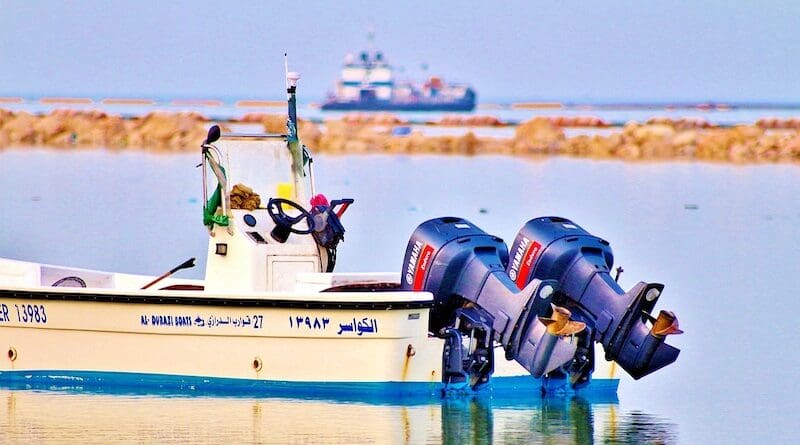Mariners Need Protection In Today’s Challenging Environment – Analysis
Throughout the world’s waterways, fishermen make a living, including around the Arabian Peninsula. It is not a glorious life for most. Fishermen and their safety requirements in the wake of some of the events that have taken place in and around the Arabian Peninsula recently require greater attention.
In this region, fishing vessels are used by more than 100,000 fishermen in their local industry. These fishing boats include fish and shrimp trawlers (both wooden and steel-hulled), large wooden boats (dhows) with both inboard and outboard engines, and fiberglass boats. Fishing gear consists of trawls, bottom-set gill nets, traps made of wire mesh and plastic, barrier traps, hand lines and knives. It should be noted that many of the plastics come from petroleum products and pollute the mariners’ work environment.
Anthropologists refer to fishing communities as “assemblages.” According to their belief system, mariners feel the rhythm of ships coming in and out of port, as well as the fate of their contents, as determined by the demands of the city. The schools of fish they catch are determined by biology, the ocean’s tides and the Earth’s seasons. Fish coming from mariners’ efforts are only meant to feed nearby communities. They do not include the larger mechanical trawling fleets that also roam the high seas.
Overfishing is disturbing the life cycle of several fish populations and risks creating an imbalance in local marine ecosystems. The biggest fish are the most desirable in markets, but they are also the most capable of reproducing and bolstering species populations. These old communities have a way of life where seafarers stay within their own requirements. This avoids upsetting the balance of fish stocks in and around the Arabian Peninsula. In this region, fishermen cooperatives are found, allowing mariners to belong as part of their community. These differ across the region.
The current environment — with drones and missiles being fired at ships and others taken over by pirates — is raising the stakes regarding the safety of mariners and their trade. Drone strikes on shipping vessels kill and injure sailors who have nothing to do with regional politics or conflicts. On legitimate fishing vessels, they provide an important service. When they are injured or maimed by explosive ordnance or taken against their will, the entire community suffers.
Mariners’ welfare as a policy issue comes under the purview of the UN-supported International Maritime Organization. This is the governing body that makes most of the regulations for the maritime industry. It has been able to develop many regulations, resolutions and guidelines. The organization helps to set the pace of the policy discussion over mariners’ safety and livelihood at the supranational level.
In conjunction with the International Maritime Organization, international shipping industry organizations are dedicated to providing comprehensive maritime security guidance to companies and mariners within small communities. There are a number of international guidance documents that are useful for understanding mariners’ dilemmas and the safety and protection procedures that are in place for them. “Global Counter Piracy Guidance for Companies, Masters and Seafarers” and “BMP5: Best Management Practices to Deter Piracy and Enhance Maritime Safety in the Red Sea, Gulf of Aden, Indian Ocean and the Arabian Sea” both contain guidance on piracy and armed robbery that can be used by mariners around the world.
Significantly, shipping industry guidance is not specifically written for the dangerous new environment. Here, local governments may be asked to boost their overall management and safety, such as by reviewing procedures. Jurisdiction in the maritime environment can become an issue and there is a sharp disconnect between the requirements of the shipping industry and local fishermen when it comes to safety and security. This issue becomes more important as shipping companies put armed guards on their own vessels.
Overall, the lifestyle of mariners has greatly improved over the past decade. The changing amenities, standards of living and technology have made going to sea a much more comfortable way to make a living for some. Unfortunately, these changes have not been uniform, resulting in many merchant mariners experiencing poor treatment, unclean drinking water, little sanitation, very low wages and lengthy periods of work without adequate rest. These working conditions can lead to extreme stress, fatigue and depression.
Add in the threat of missiles, drones, piracy and other crime and it becomes clear that great attention must be paid to seafarers’ perceptions and activity, as safety comes first. They are preyed upon by smugglers, who take contraband for delivery around the Arabian Peninsula’s waterways. This is now an acute threat.
Overall, a mariner’s life is often difficult and dangerous. It is not always an easy life, as it requires a lot of time away from home, family and friends, as well as hardships such as bad weather, dangerous work, poor living conditions and seclusion. Their responsibility is to feed large urban areas with the “wealth from the sea.” The people who do this job and get that hammour on to your dining plate are truly brave.

